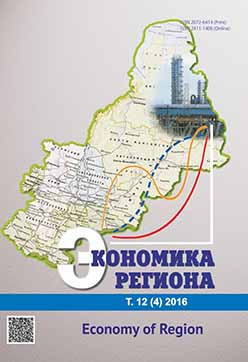Концептуальные основы перехода к нелинейной модели высшего образования в регионе
Conceptual Foundations of Transition to the Nonlinear Models of Higher Education
in the Region
Author(s): Garold Efimovich Zborovsky, Polina Anatolyevna AmbarovaSubject(s): Economy, Geography, Regional studies
Published by: Институт экономики Уральского отделения Российской академии наук
Keywords: social and economic uncertainty; risks; challenges; vulnerabilities; non-linear economic processes; nonlinear model of higher education; regional economy; the region’s system of higher education;
Summary/Abstract: The subject matter of the analysis is the non-linear characteristics of the new model of higher education in relation to itsresources and risk environment. The purpose of this article is to prove the need and the possibility of transition to the nonlinearmodel of higher education in the region on the basis of theoretical positions and the results of the study of non-linearsocio-economic processes. In this connection, the socio-economic factors of such transition are characterized; the objectivenecessity of its implementation in the context of the economic and social uncertainty of a particular region, which is UralFederal District, is shown. A new type of relationship between universities and their social partners is considered. The needfor the change of interactions between educational communities; reliance on the use of a new wide range of economic,social and spiritual resources; the constant search for new mechanisms, educational programs, relations with the externalenvironment, management decisions are argued. Ural Federal District is shown as one of the most advanced regions ofthe Russian Federation not only in the sphere of the economy, social and cultural life, but also in the sphere of highereducation. This circumstance is related to the constant, intensive search for innovative approaches to the modernization ofhigher education in the region, including the formation of its non-linear model. The presented situation forms the basis of thehypothesis that the non-linear model of higher education can ensure its competitiveness in the global educational space, toenhance its role in the society and specific regions of the country and to turn it into a locomotive of the socio-economic andsocio-cultural development. The study is based on an interdisciplinary methodology, including the potential of theoreticalsociology, sociology of education, economic sociology, management theory, regional economy. The findings of the researchserve as the basis for improving the educational policy of the Ural Federal District.
Journal: Экономика региона
- Issue Year: 12/2016
- Issue No: 4
- Page Range: 1157-1166
- Page Count: 10
- Language: Russian

